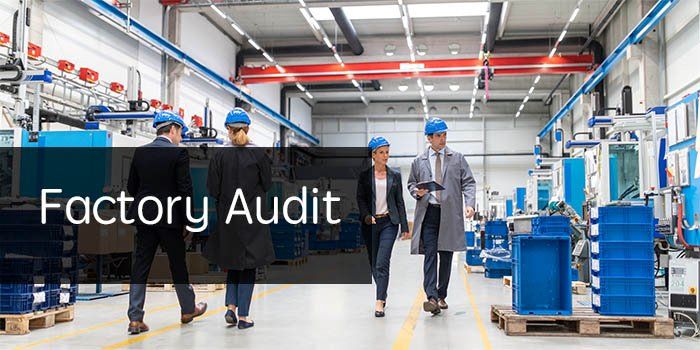Businesses need to follow quality standards and make good products no matter where they work. Audits of factories help with this. They check that everything is done right. This article will talk about factory audits. It will show what every company should know about this important check.
Understanding the Purpose of a Factory Audit
A factory audit fully checks a production line. Auditors look at how the factory runs its work, rules, and skills. They check important things like following quality plans, worker safety rules, social rules, green laws, and how good the factory makes products. Factory audits have two main goals. First, to make sure the factory follows all the rules of its quality standards. This lowers the chance of big fines and damage to its name. Second, audits help judge which suppliers to use. Auditors see how suppliers run their work and make products. This lets businesses pick reliable and good suppliers for their supply chain. This helps ensure good quality products come on time. So a factory audit is a key tool for risk management and judging suppliers.
Essential Elements of a Factory Audit
A factory audit carefully looks at important parts. One big part is closely looking at how things are made. This means checking machines, how quality is checked, how much can be made, and following the rules for what is made. Another important part is looking at work conditions carefully. This means carefully checking safety rules and employment laws to make sure workers’ rights and health are protected.
The third part looks at how management systems are assessed, concentrating on how well quality management systems, record-keeping methods, and the process of carrying out fixes work. Looking at how a factory helps or harms nature and follows green rules is the fourth important part of a factory check. It means seeing what the place does to save the environment and obey the rules about keeping things clean.
These parts each play a very important part in checking a factory, making sure the whole place is looked at carefully. Looking closely at each one leads to smarter choices, better risk control, and more trustworthy picking of suppliers.
Importance of Compliance in a Factory Audit
Following rules during a factory check is key for companies. Many groups around the world make strict rules for different industries. The rules have many goals like making products safe, protecting nature, and keeping workers happy and safe. Companies that do not follow the rules could face big problems. They may get large fines and a bad name. In rare cases, they could lose the right to make things. With such risks, companies must see following rules as a must, not a choice, during factory checks. By putting rules first, companies can protect themselves from risks. This helps them keep running well and keeps their good name for a long time.
Preparing for a Factory Audit
A good factory audit needs careful planning. First, understand the audit rules and what is wanted. Study the business standards for that industry and place. Next, check yourself inside. This finds any problems or ways to improve before the real audit. Also, get all the papers needed. Things like how work is done, quality test results, how the environment is cared for, and worker safety plans. These papers prove following the rules. Having the papers ready makes the audit go smoothly and faster. Remember, always be ready for an audit. Keep being audit-ready, helps get a good audit result.
How to Handle the Audit Process?
Navigating the audit process requires transparency, effective communication, and active involvement. Businesses must adopt a forthcoming approach with auditors, offering precise and comprehensive information. This encourages a thorough and accurate evaluation of the facility’s operations and compliance. A crucial aspect to focus on during the audit is the effective management of the audit trail. Any alterations in operational processes or systems should be well-documented and communicated to the auditor promptly, ensuring they have all relevant details for the audit. Upon completion of the audit, businesses should meticulously review the audit report. Understanding the report’s findings is critical to identify the areas of improvement. Any potential non-compliance or inefficiencies brought to light by the audit report should be rectified promptly. Businesses must treat the audit process not as an obligation but as an opportunity to refine their operations, enhance compliance, and ultimately bolster their industry reputation.
Dealing with the Results of a Factory Audit
A factory audit can turn out different. It could lead to good things or ideas to improve. No matter the results, responding quickly is very important. If issues were found that break rules, action must be taken right away to fix the problems. That helps avoid possible trouble and shows work hard to follow standards and laws. Even if an audit goes well, there is always room to get better. Companies should see this as a chance to always improve how they work. The goal is not just to pass an audit but to do great in it, turning weak points to strong points and strong points to big benefits over others. Regular review of audit reports and doing improvements soon keeps following rules, protecting the business from unexpected disruptions. So handling audit results is as important as getting ready for the audit itself. It should be seen as an ongoing process that adds a lot to how well a business grows and is thought of. Remember, every audit result, good or bad, helps move towards working better and long-term success.
The Long-term Benefits of Regular Factory Audits
Doing regular factory checks brings many good things for businesses over time. First, they make sure they are constantly following rules and laws in the industry, so this lowers risks of not following rules. This consistent following not only protects against possible punishments but also helps make rule-following part of how the organization works. Second, factory checks serve as a tool for always making operations better. By finding areas to improve, they give useful tips that can boost how well operations work and make products better. These improvements ultimately change into a more competitive and trustworthy business offers. Third, regular checks strengthen how much people trust a company. They signal to customers, suppliers, and rule authorities that the company commits to keeping high standards, further strengthening business ties and reputations. Thus, while a factory check may seem like a tough process, it can yield big wins in the long run by leading to better operations, improving reputations, and fostering long-lasting business relationships. Therefore, businesses must see factory audits not as just a compliance exercise but as a strategic process very important for ongoing business growth and long-term success.

